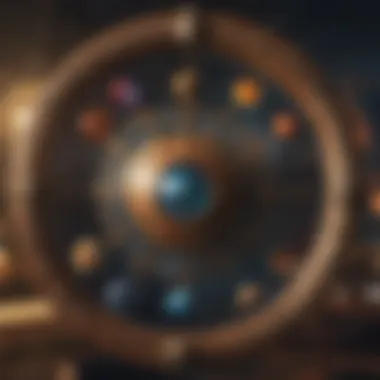Understanding Your Future Through Astrology Insights


Intro
Astrology serves as a fascinating framework for understanding our lives and futures. The practice taps into ancient wisdom, providing guidance through celestial movements. Many individuals turn to astrology not just for curiosity, but as a means to enhance their decision-making abilities. By examining astrological aspects, we learn how to interpret situations and reflect on potential outcomes. In this exploration, we will analyze specific zodiac profiles, compatibility insights, and significant astrological events. These areas will clarify how astrology functions as a tool for personal growth and foresight.
Zodiac Profiles
Overview of Each Sign
The zodiac is divided into twelve unique signs, each reflecting distinct characteristics and influences. This segment will provide insights into what each sign encompasses. We will delve into Aries through Pisces, outlining how their traits contribute to personality.
Personality Traits
Every zodiac sign possesses its own set of personality traits. Here is a brief overview of the signs that shape individual behaviors:
- Aries: Bold, energetic, and impulsive.
- Taurus: Reliable, patient, and stubborn.
- Gemini: Versatile, curious, and indecisive.
- Cancer: Nurturing, emotional, and moody.
- Leo: Charismatic, confident, and arrogant.
- Virgo: Analytical, meticulous, and critical.
- Libra: Diplomatic, charming, and indecisive.
- Scorpio: Passionate, determined, and secretive.
- Sagittarius: Adventurous, optimistic, and blunt.
- Capricorn: Disciplined, ambitious, and cold.
- Aquarius: Innovative, independent, and aloof.
- Pisces: Compassionate, artistic, and escapist.
Strengths and Weaknesses
Understanding strengths and weaknesses fosters personal growth. Each sign offers unique strengths, such as:
- Aries: Courageous leadership.
- Taurus: Strong perseverance.
- Gemini: Adaptability in social situations.
Contrastingly, every sign has weaknesses. For instance:
- Cancer: Difficulty in letting go.
- Leo: Struggles with excessive pride.
- Scorpio: Tendency toward jealousy.
This duality presents opportunities for growth through self-awareness and reflection.
Compatibility Insights
Love and Relationships
Astrological compatibility measures how well two signs harmonize. Compatibility here involves emotional and spiritual connections. Example pairings suggest:
- Aries with Leo: Both fire signs; fiery passion.
- Taurus with Cancer: Earth and water create stability and care.
Friendship Compatibility
Friendships align differently than romantic relationships. Understanding dynamics is crucial. For instance:
- Gemini and Libra: Both air signs, promoting shared interests.
- Virgo and Taurus: Earth signs fostering practical support.
Workplace Dynamics
Astrology also influences teamwork. Signs impact collaboration and communication styles.
- Capricorn: Strong organizational skills may lead group efforts.
- Aquarius: Innovation sparks creative solutions.
Recognition of these elements can improve workplace harmony.
Astrological Events
Monthly/Weekly Horoscope Breakdown
Regularly consulting horoscopes offers guidance on upcoming challenges and opportunities. Observing daily or weekly insights can direct personal choices.
Notable Celestial Events
Important celestial events, such as eclipses and retrogrades, have significant impacts. These moments invite us to reassess areas in our lives.
How to Prepare for Astrological Shifts
Preparation involves mindfulness and adaptability. Understand upcoming shifts to harness their energy.
“Astrology not only informs us about ourselves but also prepares us for the specifics of life.”


By utilizing the principles of astrology, one can navigate uncertainties more effectively. The insights gained from zodiac profiles, compatibility factors, and astrological events ensure readers feel equipped to make informed decisions.
Astrology as a Tool for Understanding the Future
Astrology serves as a unique resource for many individuals seeking to comprehend their futures. With its rich history and diverse tools, astrology provides insights that can guide people through various life challenges. It does not claim to predict the future with absolute certainty. Instead, it helps individuals identify patterns, offering a framework to understand potential pathways.
Defining Astrology and Its Relevance
Astrology is the study of celestial bodies and their influence on human affairs. It combines astronomy and mythology, viewing the positions of planets and stars at a person's birth as significant indicators of character and life events. Its relevance lies in how it helps individuals reflect on their traits, challenges, and opportunities. This reflection allows for greater self-awareness and informed decision-making.
Astrological principles like sun signs, moon signs, and rising signs are essential in this framework. They provide intricate details about how different aspects of a person's life might unfold. Furthermore, astrology appeals to those interested in holistic approaches to life, enhancing personal development and understanding.
Historical Perspectives on Future Predictions
The use of astrology to predict future events has existed for thousands of years. Ancient civilizations, such as the Babylonians and Egyptians, relied on celestial observations for both personal and societal insights. They constructed elaborate systems to chart planetary movements, often intertwining their findings with mythology and religion.
Historians note that astrology served various purposes, from determining agricultural cycles to advising kings. As society advanced, the approaches evolved, yet the core objectives remained similar: to provide a framework for understanding life’s unpredictable nature. For many, these historical roots add layers of depth to modern practices, reinforcing the belief that astrology is more than a mere curiosity but a time-tested tool for guidance.
Scientific Critiques of Astrological Forecasting
Astrology has faced significant scrutiny from the scientific community. Critics argue that there is insufficient empirical evidence supporting its claims. A primary point of contention lies in the question of causality; skeptics often find it challenging to comprehend how celestial bodies can influence individual experiences.
Studies have sought to debunk astrological predictions, showing no correlation between zodiac signs and personality traits or life outcomes. Despite this, followers maintain that astrology's value lies not in its predictive power but in fostering personal introspection and offering a different lens through which to view one's experiences. This ongoing debate highlights the complex relationship between astrology and science, emphasizing the subjective nature of belief and understanding.
Astrology may not be scientifically validated, yet its cultural and personal significance can impact lives in profound ways.
In summary, while some reject astrology for its lack of scientific backing, others embrace it as a meaningful tool for navigating life's dilemmas. This juxtaposition reflects broader discussions around belief systems, knowledge, and the ways humans seek to understand their existence.
Key Astrological Concepts to Know
Understanding astrological concepts is essential for anyone seeking to navigate the complexities of life through astrology. These principles offer a framework to interpret how celestial events may influence individual experiences. By grasping key elements like zodiac signs, planetary movements, and houses, readers can better apply this knowledge to personal situations. Here, we will explore these concepts, offering insights that can aid in decision-making and personal growth.
Understanding Zodiac Signs and Their Impact
Zodiac signs represent different personality traits and characteristics based on one's birth date. Each sign is linked to specific qualities and tendencies, providing insight into behavior and relationships. There are twelve signs in total, and each one has unique attributes.
For instance, Aries is known for being assertive and energetic, while Pisces is seen as intuitive and empathetic. Understanding your zodiac sign can help clarify motivations and tendencies, both personally and in relationships.
Additionally, understanding zodiac compatibility is significant in fostering harmonious unions. Compatibility between signs can illuminate potential challenges and strengths. Astrology enthusiasts often look to zodiac signs when analyzing friendships, family dynamics, and romantic relationships. Recognizing these patterns can serve as a guide in establishing more enriching connections.
Planetary Influence and Motion
The movement of planets affects astrological readings significantly. Each planet symbolizes different aspects of life, influencing emotions, thoughts, and actions. For example, Venus is often associated with love and beauty, while Mars is linked to aggression and motivation.
In astrology, the positions of these planets at the time of one's birth (known as natal charts) reveal how these influences manifest in an individual's life. Their ongoing motion impacts day-to-day experiences. For instance, a retrograde planet can signify periods of reflection or challenges in specific areas of life, depending on the planet involved.
Astrologers follow planetary transits to offer insights into personal and collective experiences. Being aware of these influences can allow individuals to align their actions with the cosmic energy present, increasing the probability of positive outcomes.
Houses in Astrology: A Blueprint for Life
Astrological houses serve as a blueprint outlining various facets of life. There are twelve houses, each connected to different life areas like relationships, career, and home. The first house represents the self, while the seventh house pertains to partnerships.
Understanding which planets reside in specific houses can provide profound insights into how different aspects of life resonate with an individual. The positioning of planets in these houses during significant events can signal turning points or periods of growth.
For instance, if Jupiter is in the tenth house, it may indicate that professional opportunities and public visibility will increase. Conversely, if Saturn is in the fourth house, it may signal challenges relating to home and family. By observing these placements, individuals can gain a clearer picture of their journey and formulate strategies to navigate their life path.
The integration of zodiac signs, planetary influences, and houses in astrology equips individuals with valuable tools for understanding themselves and their place in the universe.
Tools for Astrological Analysis
Astrological analysis serves as a bridge to understanding the subtleties of life through celestial patterns. It offers significant insights into personal growth, decision-making, and understanding relationships. Several tools provide distinct layers of interpretation, allowing individuals to align their choices with cosmic influences. Using these tools, one can gain deeper insights into personal characteristics and life trends.
Natal Charts: Your Personal Horoscopes
A natal chart is a foundational tool in astrology. It maps the position of the planets at the exact moment of a person's birth. This diagram represents not just the sun sign but also the moon sign and rising sign, all playing crucial roles in shaping personality.


Key Elements of Natal Charts:
- Sun Sign: Represents core personality.
- Moon Sign: Reflects emotional nature.
- Rising Sign: Indicates how one presents to the world.
The natal chart aids in self-discovery. Understanding its elements can elucidate personal strengths, weaknesses, and motivations. By reflecting on these aspects, individuals can navigate choices in life more effectively, making decisions that align with their true selves.
Transits and Their Significance
Transits refer to the current movement of planets in relation to the natal chart. This tool is instrumental in understanding the timing of events. When a planet transits over a particular point in the natal chart, it heralds specific opportunities or challenges.
Benefits of Analyzing Transits:
- Timing: Recognizing favorable times for actions.
- Awareness: Understanding potential challenges ahead.
- Adaptation: Shaping strategies to cope with influences.
Transits offer a dynamic perspective on one’s life journey. By regularly checking them, individuals can prepare themselves mentally and emotionally for what's to come.
Progressions: Learning from Your Past
Progressions extend the idea of natal charts by considering the evolution of personal development over time. Unlike transits, which focus on planetary movements, progressions move the natal planets forward as if time progresses at a rate of one day for each year of life.
Importance of Progressions:
- Reflection on Growth: Insights into past influences.
- Long-Term Planning: Identifying future trends based on personal history.
- Self-Understanding: A framework to consider past decisions and their effects.
This method allows for a deeper understanding of how personal motifs and tendencies evolve, enabling informed decisions based on a rich history.
Synastry: Compatibility in Relationships
Synastry analyzes the interplay between two individuals’ natal charts. It sheds light on relational dynamics, highlighting areas of harmony and potential conflict.
Key Aspects of Synastry:
- Comparative Analysis: Understanding how two charts resonate.
- Identifying Strengths and Weaknesses: Pinpointing compatibility aspects.
- Guidance for Growth: Offering insight on how to enhance relationship dynamics.
By utilizing synastry, individuals can enhance interpersonal relationships, ultimately fostering a greater understanding between partners, friends, or family members.
“Astrological tools like natal charts, transits, progressions, and synastry can profoundly influence personal evolution and relational dynamics.”
In summary, tools for astrological analysis offer a framework for understanding oneself and navigating life’s complexities. Each tool provides unique insights, and together they formulate a more comprehensive view of an individual’s path through time.
Practical Applications of Astrology
Astrology serves as a lens through which individuals can assess their lives, make decisions, and shape their futures. The practical applications of astrology include methods and frameworks that help users navigate varied aspects of their lives with an informed perspective. Leveraging astrological insights can lead to personal growth, enhanced relationships, and a deeper understanding of one’s career trajectory. By employing astrological concepts, individuals can uncover possibilities they may not have considered before, leading them to act with confidence.
Making Informed Decisions Using Astrology
Astrology can be a guide for making informed decisions. Many people face uncertainties in daily life, whether regarding personal choices or larger life-changing situations. In these moments, astrology can provide a backdrop for reflection.
Personal horoscopes, derived from natal charts, can reveal innate tendencies and preferences. By studying planetary positions, individuals can discern when to act or wait. For instants, if Mercury is in retrograde, one may choose to delay significant decisions like signing a contract or starting a business. These insights lead to decisions that align with personal energy cycles.
- Identifying favorable periods: Knowing when the planets are in advantageous positions can help in timing decisions.
- Understanding personal strengths and weaknesses: Astrology provides clarity on what areas to leverage.
- Recognizing challenges: It can alert individuals to potential issues, allowing them to prepare and adapt.
Astrology empowers people to anchor their decisions in a cosmic context, reducing doubt and fostering clarity in their choices.
Navigating Career Choices and Changes
Career decisions often come with turmoil, uncertainty, and stress. Astrology can be of great benefit during these times. By analyzing one's natal chart, individuals can explore their professional inclinations.
For example, specific house placements can indicate career paths that may be fruitful. Those with strong placements in the tenth house may lean towards leadership roles, while others might find satisfaction in creative endeavors emphasized by Venus influences. Understanding these tendencies can lead to more fulfilling career choices and ultimately, successful transitions.
Moreover, astrological transits can offer clues, revealing when to pursue promotions or when to consider new job opportunities. Just as the changing seasons offer various opportunities in nature, astrology can help one align with career cycles.
Enhancing Personal Relationships through Astrology
Relationships form a vital part of our life journey, and astrology offers insights that can strengthen bonds with partners, friends, and family. By examining synastry, individuals can understand compatibility with others based on their astrological charts.


- Exploring relational dynamics: Understanding how different signs interact can highlight areas of tension and harmony.
- Identifying growth opportunities: Astrology can reveal patterns in relationships that need attention, guiding individuals toward meaningful conversations.
- Timing for relationship decisions: Just as with career decisions, certain periods may be more opportune for deepening commitments or resolving conflicts.
Astrology thus plays an instrumental role in helping people cultivate deeper and more meaningful relationships with those in their lives. Leveraging these insights provides tools for better communication and understanding, ultimately leading to personal and relational growth.
Looking Ahead: Future Trends in Astrology
Exploring future trends in astrology is crucial for understanding its evolving relevance in contemporary life. As society progresses, astrology adapts alongside technological advancements, increased interest from the public, and growing acknowledgment of its potential benefits in mental health. This section delves into these specific elements, illustrating how they reshape astrology’s role in personal development and decision-making.
Technological Influences on Astrological Practice
Technological advancements greatly affect how astrology is practiced and accessible. The internet has democratized knowledge, offering vast resources that cater to both novices and seasoned practitioners alike. Websites and apps now provide personalized horoscopes, cast natal charts, and analyze transits with just a few clicks.
- Software: Applications like Co–Star and Astromatrix utilize algorithms to generate insights based on your astrological data. Users can receive tailored forecasts directly to their smartphones.
- Social Media: Platforms like Instagram and Reddit host vibrant astrology communities that prompt discussions, share insights, and offer support.
- Webinars and Online Courses: Learning about astrology no longer requires physical classes. With online resources, individuals can deepen their understanding from home at their own pace.
Technological integration allows astrology to reshape itself continuously, making it more relevant to younger audiences and to those seeking guidance in uncertain times.
The Rising Popularity of Astrology in Modern Society
Astrology's resurgence in popularity is evident in various aspects of contemporary culture. As people face unprecedented levels of anxiety and uncertainty, many turn toward astrology for comfort and guidance. This trend is fueled by several factors:
- Cultural Shifts: In a world where traditional belief systems are often questioned, astrology presents an alternative framework for understanding life events.
- Celebrity Influence: Public figures openly discussing astrology have led to increased interest from their followers, driving home the notion of astrology as a viable tool for introspection and planning.
- Access to Information: The rise of social media and blogs has allowed people to share their astrology experiences, making information more available and accepted.
This growing interest correlates with a larger search for identity and meaning, suggesting that astrology will continue to play a significant role in how individuals navigate their realities.
Astrology and Mental Health: A Growing Relationship
The connection between astrology and mental health is gaining recognition. Many people find solace in astrological insights that validate their feelings and experiences. This relationship can provide several benefits:
- Self-Reflection: Astrology encourages individuals to reflect on their feelings in the context of their chart, fostering greater self-awareness and acceptance.
- Guidance: Astrological forecasts can assist individuals in making informed decisions about their emotional well-being.
- Community Support: Engaging with astrology opens up avenues for community discussion, reducing feelings of isolation as individuals share their experiences.
Mental health professionals increasingly acknowledge that astrology can serve as a tool for therapy, helping clients articulate feelings and cope with life's challenges.
As the lines between astrology and mainstream thought blur, it is essential to approach this ancient practice with an open mind, essential for personal growth and understanding.
Overall, the trends indicate a thriving future for astrology, affirming its relevance in modern society as a guiding force amidst complexity.
Criticism and Controversies in Astrology
The practice of astrology has faced substantial scrutiny and controversy throughout its history. Engaging with these questions is essential to understand its place in modern contexts. This section highlights varied perspectives surrounding astrology and aims to foster a thoughtful dialogue about its relevance today.
Debates within the Scientific Community
Astrology's scientific legitimacy is frequently challenged by skeptics. The scientific community often argues that astrology lacks empirical support and cannot be validated through controlled studies. Critics point out several key issues:
- Absence of Causation: Astrology relies on the premise of celestial bodies influencing human behavior, yet there is scant scientific evidence demonstrating causative relationships.
- Reproducibility Problems: Studies designed to test astrological predictions often fail to yield consistent results, prompting skepticism among researchers.
- Confirmation Bias: Astrological affirmations can be seen as subjective. Individuals may remember successful predictions while overlooking failed ones, creating a distorted sense of accuracy.
- Astrology vs. Astronomy: The confusion between astrology and astronomy further complicates debates, as they represent distinct fields of study. Astronomy, grounded in scientific principles, observes celestial phenomena without attributing them to human affairs.
Despite these arguments, there remains a subsection of researchers exploring astrology's historical and cultural significance. Some scholars advocate for a more nuanced view—acknowledging astrology as a form of art rather than a science, situated within social and psychological contexts.
"Astrology may not be a science, but it still serves as a framework for understanding human experiences."
Astrology and Ethical Considerations
As astrology gains traction in contemporary society, ethical questions emerge regarding its use. Practitioners and clients alike must navigate complexities that stem from beliefs and expectations tied to astrological interpretations. The following considerations deserve attention:
- Informed Consent: Astrologers should ensure clients understand what astrology can and cannot offer. Clear communication about the nature of predictions helps manage clients' expectations.
- Vulnerability of Clients: clients seeking astrological guidance may be in vulnerable mental states. Astrologers must approach their work with care and emotional sensitivity, recognizing the profound impact their words can have.
- Accountability: As astrology becomes more mainstream, professionals in the field should promote ethical practices. This includes using tools responsibly and avoiding manipulation.
- Representation and Diversity: It is crucial to embrace a range of perspectives within the astrological community. Encouraging diverse voices can contribute to a richer understanding of astrology's cultural implications.
Finale: Astrology as a Guide, Not a Determinant
Astrology serves as a profound tool that can illuminate various aspects of life, providing guidance rather than imposing rigid pathways. By understanding astrological influences, individuals can better navigate their decisions and future prospects. It is essential to grasp that astrology does not dictate one's fate. Instead, it offers insight, aiding in the understanding of personal circumstances and potential outcomes.
Embracing Uncertainty in Life
Life is inherently uncertain. Many find comfort in astrology, as it provides a framework to interpret events and situations. Recognizing that uncertainty exists is the first step toward embracing it. Astrology allows individuals to reflect on their possibilities and uncertainties, fostering resilience in the face of the unknown.
Astrology encourages one to approach life’s unpredictability with a sense of awareness and openness. For instance, by analyzing natal charts, people can identify patterns that highlight both strengths and challenges. This insight can prompt proactive engagement with situations that may otherwise induce anxiety. Understanding that the cosmos affects personal energies helps to normalize feelings of uncertainty, transforming them into opportunities for growth.
"Astrology can serve as a source of empowerment, transforming uncertainty into stages for personal development."
The Value of Personal Agency in Future Planning
While astrology can offer valuable insights into potential life paths, it is vital to maintain personal agency. People are not merely products of their astrological charts. They possess the power to make choices and impact their lives positively. This balance between astrological guidance and individual decision-making is crucial for effective future planning.
Astrology encourages self-reflection, prompting individuals to consider their values and aspirations. For example, when faced with a major decision, one might refer to their astrological insights but ultimately weigh personal desires against these influences. By doing so, they can establish a vision for their future that is both informed by celestial guidance and firmly rooted in personal choice.



